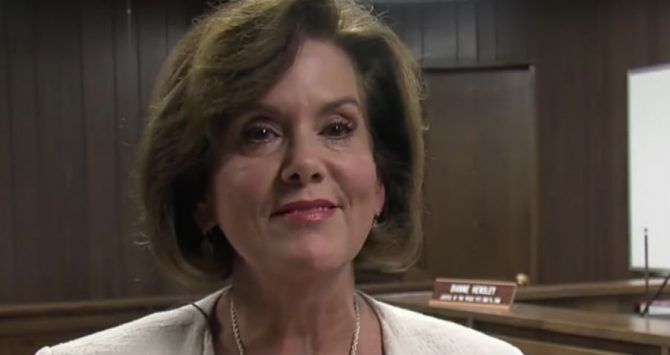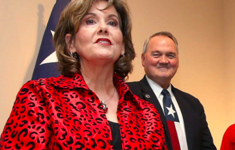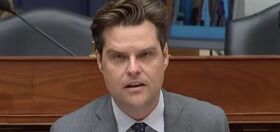
Regular longtime readers of Queerty may remember Justice of the Peace Dianne Hensley of Waco, Texas.
Hensley says she does not wish to marry same-sex couples as it goes against her religious beliefs. She was issued with a warning in 2019 by the Texas judicial commission for directing same-sex couples to other officiants.
Hensley’s now using the recent Supreme Court ruling on businesses refusing LGBTQ+ customers to back up her stance.
Following her 2019 warning, Hensley—a devout Christian—filed a class-action lawsuit against the State Commission on Judicial Conduct. The lawsuit sought to enable her, and other justices of the peace in Texas, to decline to marry same-sex couples. That lawsuit was tossed out in 2021.
Officiating marriages is optional for justices of the peace in Texas. Hensley could have followed the example set by some of her colleagues and simply stepped down from officiating weddings.
However, conducting the ceremonies is lucrative. Between August 2016 and late 2019, Hensley conducted over 300 wedding ceremonies, all for opposite-sex couples. Hensley earned around $25,000 for these duties, according to the Houston Chronicle.
Related:
Texas court throws out judge’s lawsuit after she refuses to wed same-sex couples
“I have no desire to offend anybody but the last person I want to offend is God,” said Justice of the Peace Dianne Hensley.
303 Creative LLC v. Elenis
The Supreme Court recently ruled (303 Creative LLC v. Elenis) that a business owner can turn away customers if it asks that business to produce materials (wedding invites, wedding cakes) that clash with their religious beliefs. SCOTUS ruled in favor of a Colorado-based graphic designer (Lorie Smith, founder of 303 Creative). She declined to make a same-sex-wedding-themed website for a client.
Despite Hensley’s lawsuit being dismissed in 2021, last month, the Texas Supreme Court said it will hear arguments on whether to revive the her lawsuit, reports the Texas Tribune.
Hensley submitted a brief last week citing the recent Supreme Court decision. Her lawyers argue that the SCOTUS decision, based on the First Amendment, overrules the earlier decision by the lower court in Texas.
“303 Creative was interpreting the First Amendment’s Speech Clause rather than the Texas Religious Freedom Restoration Act. Its holding is nonetheless instructive because it rejects the idea of a ‘compelling interest’ in forcing wedding vendors to participate in same-sex and opposite-sex marriage ceremonies on equal terms,” the brief states.
ZIP code lottery
Some legal experts suggest Hensley is clutching at straws. The SCOTUS ruling applied to private businesses, not government officials acting in an official capacity.
Dale Carpenter, chair of constitutional law at Southern Methodist University’s Dedman School of Law, told the Texas Tribune, “I don’t think 303 helps the judge’s case at all.”
However, he said this could be the first of many attempts to extend the SCOTUS ruling to other services.
Ash Hall, of ACLU Texas, said if Hensley wins, LGBTQ+ rights in the state take a huge step back
“If Judge Hensley were to actually win this case, it would basically gut a good portion of marriage equality that we got. Your ability to get married then would be dependent on your ZIP code and kind of what resources were around you.”
Related:
Judge who said she’s “entitled” to discriminate against gay couples slapped with misconduct warning
The Texas Commission on Judicial Conduct issued a warning to Judge Diane Hensley for her discriminatory practices.




















abfab
Hello Kangol! Finally! x
Kangol2
Yes, I was waiting for Queerty to post about this. It’s horrifying but not surprising, and it’s a preview of what the Republican Party, far-right Catholic and evangelical Christianists and White nationalists have planned for every state if given their way.
For all of those people who are braying about trans people being the wedge issue, just keep in mind that these fanatics NEVER stopped plotting and planning, and after their gay marriage bans in 2004 to help elect George W. Bush, they got their apotheosis in Donald J. Trump the Con, who appointed numerous far-right judges to the federal judiciary, as well as three extremists to the Supreme Court, in order to help ram through deeply unpopular extreme racist, misogynistic, anti-gay (yes, anti-gay) and anti-trans policies.
They are doing this even though a majority of Americans do not agree with this crap. They are using the states and the courts and every lever they have, and unless people wake up and stop voting for them, it’s only going to get worse!
m
This was planned all along. Fake case that lead the fraudulent judges to rule on it for future cases to Segway into them ruling against marriage equality
monty clift
If she doesn’t want to offend God, then why did he give her that face?
gothvixen
LOVE it! Justified. We all know the smug face of the middle-class bigots.
Mister P
Anyone like this who is pro discrimination should be disqualified from being a judge.
Openminded
Why are these “ultra religious” fakes allowed to cherry pick which of God’s rules they won’t break. Does she deny previously married people or atheist from her services?
stanley
But I suffer not a woman to teach, nor to usurp authority over the man, but to be in silence.
1 Timothy 2:12
I guess we’re just ignoring that one.
guezwhoitis
Can we as a COLLECTIVE scream….. Wish this tw@t fall to a mass shooting and be another name to the ideology she shares with the shooter!
Kangol2
I get what you’re saying but it’s not just her. Right-wingers are planning this for all over the US!
Please, people, wake up. This is not an isolated case or issue. They are akin to a Christian Taliban or Iranian mullahs, and are planning to use 303 Creative LLC v. Elenis and future cases as their bludgeon to take LGBTQ out. Please see the larger picture and PLEASE stop voting for Republicans! This is the world they’re hoping to enable, and if we don’t watch out we’ll be in a situation as bad as Hungary or worse, Russia!
dbmcvey
This is what they’ve been doing all along. When the conservative trolls on this site poo poo our concerns about Republicans this is what we need to remember.
Decans, Shaver, Inbama… looking at you.
decrans
I co-sign this. Why should this woman have to stifle her religious beliefs just to suit you? Freedom of speech and freedom of religion. Two tenets of the American fabric. I’m also flattered that I’m the first person to occupy your thoughts.
Bosch
Freedom of religion does not mean freedom to discriminate.
If your religion prevents you from doing your job, then you need a different job.
decrans
Uh huh. And what legal basis do you base your assertions?
decrans
Bosch, America is a pluralistic society. It’s right there in the founding of this country. And in pluralistic societies, the founding fathers inscribed values of both equality and religious freedom that seek to advance both objectives. The gay couple has other options for a justice of the peace, ones which do not encroach upon the religious freedoms of others. And that’s America!
dbmcvey
This shows who decraps has always been. He’s a homophobic, anti-LGBT activist who has been trying to gaslight us. We knew who he was, but now he’s shown it.
He is an enemy of the LGBT community. He is a collaborator.
Den
“Why should this woman have to stifle her religious beliefs just to suit you? Freedom of speech and freedom of religion.”
Yet another right winger who has no idea what the first amendment means.,. Just like you fools have no idea what the 2nd amendment means within the context of the rest of the constitution, or what tariffs are. or what science is….
She is in government employ, not private business. AND officiating at marriages (which are secular contracts, not religious rituals) is an optional part of her job. She wants the money, but he also wants to discriminate against federally protected classes. Either she officiates at marriages, or she opts out. Nobody is interfering in any way with her ability to practice her religion when where and how she wants. She, by contrast, wants to flout the law in the name of “faith”. A mendacious hypocrite, as you are.
Get an effing brain!
Den
Decrans will also “co-sign” when judges who share “his” views decide that their “freedom of religions and freedom of speech” allow them to pass on marrying Jews, People of color, interracial couples, couples of mixed religion. He will also “co-sign” when the same “freedom of religion and freedom of speech” extends to restaurants, pharmacies, hospitals, institutions of higher learning, real estate agents, and on down the line. Then when privacy laws fall and (assuming he is gay or that someone actually has sex with him) when the cops break down hi door foe “the crime of sodomy” he’ll “co-sign” on that and gladly perp-walk to prison. I have to assume that this troll is not gay, as it is hard to conceive of the dullness that allows someone to gleefully participate in their own loss of rights and freedoms.
decrans
Honestly? As a de-trans person, I was knifed in the back by the LGBTQ+ community and I never cared about marriage rights. It opens the door to polyamory and all kinds of arrangements that are damaging to children. I lived at a genderqueer commune. And I’m well aware of the small kids exposed to in-your-face sexuality at these places where your side just looks the other way and kids get abused. So no, I don’t co-sign marriage rights between the same-sex anymore. That’s my life experience! Don’t like it? I lived it and I believe what I believe.
decrans
Yeah, you are interfering with practicing her religion however she wants. Go to another Justice of the Peace. Nobody is forcing you to swing your ego around. That’s another reason I left liberalism. Similar to conservatives, y’all are the biggest bunch of overgrown children I’ve ever seen in my life. In free-market capitalism, EVERYONE has to make choices that go against their belief system on a daily basis. EVERYONE. That’s how capitalism works. Y’all are not special Suzy Snowflakes. You can easily go to another business that properly aligns with your belief system. Millions of adults DO IT EVERY DAY.
dbmcvey
Oh look, our own little Ernst Rohm is back. No descrans, we’re not interested in being in your SA.
decrans
And yet, you continue to comment obsessively. It’s bizarre.
dbmcvey
We see who you are decrans. You’re repulsive.
abfab
Recall this bitch. She must be one of our many resident GOPTROLL FAG-HAGS who enjoy annoying Gay men….(Mario, Shaver, decan’t and inALABAMA)
Kim Davis is still a cretin. And so is this Texas Judge, who will also go down in flames.
~~~~~~~~~~
Kim, former county clerk for Rowan County, Kentucky, who gained international attention in August 2015 when she defied a U.S. federal court order to issue marriage licenses to same-sex couples. Davis was elected Rowan County Clerk in 2014. Wikipedia
Born: 1965 (age 57 years), Morehead, KY
Spouse: Joe Davis (m. 2009), MORE
Party: Republican Party
Marriage location: Morehead, KY
Children: Erin Elizabeth Wallace, Allison Mae Davis, Kacie Nicole Wallace, Nathan Davis
Parents: Ray Bailey, Jean Bailey
Nationality: American
decrans
Abs, please ask your doctor about Depakote. It may be right for you.
abfab
Why, because it’s right for you? Fu ck off.
Bosch
It’s used for borderline personality disorder, that’s why he knows it.
He clearly isn’t taking it though.
monty clift
Queerty please ban this QAnon peddling homophobic trash that is abfab.
decrans
I concur. He’s literal sewage trash.
dbmcvey
Decraps is an anti-gay zealot. He is an enemy of freedom. He is a fascist collaborator.
Den
The “QAnon peddling homophobic trash” seems clearly to be decrans, who applauds the retractions of rights for LGBT people, and supports the obvious enemies of LGBT people as well as other designated protected groups.
decrans
And what other designated protected groups would those be?
dbmcvey
Hey decrans, considering you’d basically be the one loading prisoners in the boxcars to the concentration camps, you should just stop asking questions.
You’re disgusting.
abfab
Another Q Anon douchebag. RFK is toast. Allow him to talk so that we know who we are (and are not ) dealing with…..
Kennedy has promoted many falsehoods about science and medicine. Seen at Italian fixture Tony’s Di Napoli in the Post’s video, he tells his companions: “In fact, COVID-19, there is an argument that it is ethnically targeted. COVID-19 attacks certain races disproportionately.”
He went on to say that “COVID-19 is targeted to attack Caucasians and Black people” because of “the genetic structure” of the virus.
“The people who are most immune are Ashkenazi Jews and Chinese,” Kennedy said, giving no evidence. He made sure to say he did not know whether the virus was “deliberately targeted or not.”
In a Saturday tweet addressing the Post story, which Kennedy called “mistaken,” he wrote that he does “not believe and never implied that the ethnic effect was deliberately engineered.”
HUFF
decrans
Yeah, but Joe Manchin and Cornel West are just getting started, Abs. There’s also the possibility of an RFK third party run. I’m looking forward to seeing Joe Biden getting his a$$ handed to him in 2024 from former liberals like me. God, it’s going to be spectacular. I’m already popping popcorn.
dbmcvey
DeCraps works for anti-gay politicians. He pretends it’s just because he’s a whore for money but he is an actual anti-gay activist. He is the enemy.
dbmcvey
Docraps claims to be a “former liberal” but he is just an anti-gay bigot. He is a zealot and he wants us to lose our freedoms. He has shown his true colors.
decrans
I was actually a socialist and Bernie supporter. Then I moved to California and saw liberalism for what it really was.
dbmcvey
You’re disgusting decraps, you’re trying to take away our rights. You’re at best a liar, at worst a kapo. You’ll be rounding people up for the camps.
Kangol2
Kennedy is batsh!t crazy and has been for a while.
And excuse me, but when did White Ashkenazi Jewish people cease to be Caucasian? Do people realize how extremely racist RFK Jr.’s comments were? I mean, in addition to the racism against Chinese people and the lie about Black people and that virus, the idiot basically repeated Nazi rhetoric.
He is beyond revolting, which is why he is being promoted by right-wing fanatics like Steve Bannon, etc.
abfab
And who the fuc wants to see him doing push ups and bench presses in the nude!!!!!!!!!! He’s gross and even his poor wife is running away . RUN!
He did do one thing……………Ashkanazi Jews are now trending.
GentlemanCaller
Seems to me that if you’re not interested in complying with ALL the laws, then why the hell are you going out of your way to voluntarily seek election to a judicial position? If marrying same-sex couples is an affront to your pinheaded religious beliefs, then don’t be a justice of the peace, because justices of the peace don’t get to refuse to marry people who can legally be married. Similarly, if you don’t want to dispense hormones to trans people or birth control to women, don’t become a pharmacist. People in regular jobs need to stop thinking that they’re so delicate and special and privileged that they get to choose their customers to conform with whatever dopey mythology they’ve been brainwashed to think is real.
decrans
The American Pharmacists Association recognizes an individual pharmacist’s right to refuse while supporting systems that ensure the patient’s access to legally prescribed medication. Conscience clauses are in place in most states and corporations typically back up their employees while providing the customer with an alternate route. We live in a plurality culture. A good chunk of Americans would say you are asking for special rights and privileges based on your dopey mythology, too.
Bosch
A good chunk of Americans would say you have small dick energy.
decrans
The women on FetLife would beg to differ. I can give you my profile since you think fondly about my peen so much, Bosch.
dbmcvey
Deraps is an anti-gay bigot who wants us to lose the freedoms we have fought so hard for. He is a part of the agenda to take away our marriage rights. He is the enemy.
Den
“We live in a plurality culture.”
Not if regressive minded people like decrans get the kind of society they desire. I doubt he is a member of any of the minorities whose rights’ erosion he rejoices in. He is likely a white, heterosexual, protestant man who gets some sort of charge from his right wing trolling of a gay site.
Den
“The women on FetLife would beg to differ.”
HaHaHaHaHaHa!
Not surprised “he” has a profile on one of the sites most filled with posers and imposters, one of the fetish site where gay subscribers are most likely to be met with homophobia and bullying! A site where essentially nobody is who they claim to be, and nobody wants to do anything IRL. It’s all losers.
decrans
I’m actually trying to become straight in my old age because that’s how fed up with the LGBTQ+ community I am. Again, life experiences! Livin’ at a genderqueer commune where gays flap their dongs in children’s faces. That’s where this movement is headed, and I got off the roller coaster of crazy. (Shrugs)
dbmcvey
So here’s our kapo, back again. If you want to be straight, stop posting on gay websites you disgusting hypocrite.
decrans
I like talking about my experiences. I am part of the reason for the Overton Window shift occurring in society right now with these issues. I figured I’d give you a front-row seat.
Openminded
Decrans, just because you were flapping your dick in children’s faces hardly means all gay men act the same. Commune life is so 60’s, but your previous confessions of your bad life choices fit that lifestyle perfectly. Did someone knock on your door one day and say come with us little boy, we’re going to make you into a girl? Why is it the LGBT communities fault that you made a choice that was poorly suited to you? Can you not take responsibility for your bad life choices or are you simply another snow flake looking to bash and blame anyone other than themselves? I can’t claim to totally understand transgenderism, but I can totally support any adult’s right to choose to pursue corrective actions appropriate to their gender feelings. Just because transitioning turned out not to be for you doesn’t mean it can’t help many other people. I can only hope that others will do a much better job of researching the issue than what you obviously did.
decrans
Because a lot of what’s presented in the mainstream media is misinformation. And commune culture has grown to LGBTQ+ parades where grown men parade their genitalia in front of children. That’s why.
decrans
And also: A lot of what I was presented with at transgender clinics was misinformation. I take responsibility, but I refuse to co-sign when children are involved. Sorry, not sorry, Demi Lovato.
decrans
Here’s where the fault lies. Everyone can perk their ears at this. Therapists should be trained to dissect gender trauma. And yet, a certain segment pushes a transgender agenda for pure profit. We see it with mentally ill teenagers with amputated breasts on Twitter including that de-transitioner from MTV. With the proliferation of mass shooters in society, we can all agree that mental illness is a problem, yes? Good. Everyone needs to start getting off their a$$es and seriously re-evaluate the access points to mental health in our country. Since trans activists control a segment of American medical organizations at the moment, that drowns out people like me with extensive gender-related trauma who are shoehorned into easy profit. That’s why the conservatives are pissed, gang. Progressives historically have tut-tutted corporate bodies in this country. Not on this issue they don’t. And a chunk of kids and mentally ill people are shoehorned into the consequences. So yes, I can take responsibility. But when my former doctor at Vanderbilt makes a speech about profit motives, people of conscience should perk their ears up. Responsibility to a certain degree, but most rational people can see that the system is deeply flawed with activists overriding certain demographics and money being worshipped for quick fixes. That’s not on me.
decrans
And lastly, I get that this openminded commenter is conservative-leaning or whatever. So again, yes to personal responsibility. As a former leftist, I came together with Matt Walsh on the Big Business of being trans. Our ideas are aligning on this issue. I saw it firsthand with a therapist telling me to rub cocoa butter on my a$$ to unleash the inner woman inside. What are we going to do about the mental health crisis in our society? It’s literally killing Americans. Take personal responsibility and use that conservative adage? It can only go so far, openminded. And people are being shot in the interim. It’s time to get real.
dbmcvey
decrans (aka Our Ernst Rohm) just stop. You’ve shown who you are. We see how you want to take away our hard earned rights. We don’t need kapos like you.
decrans
Dave Matthews, here’s my honest assessment of your Nazi blatherings. Liberals said the same thing for George W. Bush, John McCain, Mitt Romney, etc. Do you seriously believe Nazism is coming to the forefront? And if so, why aren’t you leaving America right now? That tells me that you aren’t serious about this and it’s performative.
dbmcvey
Hey Ernst Rohm. I get that you’re disappointed in your life. You (assuming you’re telling the truth) were an unhappy gay man and then an unhappy trans person. I get that you’ve had a lot of humiliations and you want someone to blame. You have failed so hard over and over and someone other than yourself must be responsible, so now you think if you’re straight it will all be okay.
I hate to tell you this but it won’t, because the issue is you. That you now will use your disappointment, like Hitler’s failed art career, and try to take it out on the entire LGBTQ+ community is repellent and shameful. Get into therapy and stop trying to hurt trans people and other gay people. It’s not there fault that you’ve messed up. Just take some time off from this ridiculous crusade. I’m sorry you’re apparently dependent on the DeSantis campaign for you living but this is just another stupid mistake. You have to realize that you’ve hit bottom and you need to save yourself. There are people who can help you but they’re not on this website.
Get help dude. You don’t have to keep screwing up.
jarednorth30
Dave Matthews, I’ve always disagreed with the notion of gay marriage. Marriage itself shouldn’t be within the purview of the government. And as I mentioned before, a lot of these libbed-out gay parents have helped usher in gender confused offspring. There’s already a push from the far left for polyamory, which will further erode stable environments for children. I was never on board with gay marriage. I’ve also mentioned REPEATEDLY that healthcare is few and far between for working-class people under Medi-Cal. It’s a joke. And you know it’s a joke from the amount of scathing Yelp reviews I posted about Los Angeles’s LGBTQ clinic.
DBMC
Get help Ernst Rohm,
Being a pathetic loser who wants to be straight but keeps posting on gay websites isn’t a good look for anyone.
decrans
And where do you suggest? Dave Matthews, you’re just the same as the conservatives telling homeless people to get a job. Just admit it, Dave. You’re conservative, too. Admit it to yourself and admit they have good ideas. You’re already there parroting their adages.
mildredspierce
Who gives a rat’s ass what that old twat and her twisted god think. I know more gay and straight couples who are happier without benefit of the approval of a fantastical entity.
abfab
Another church lady-bitch. Old twat is right! Sad and desperate, trying her best to do the right thing and please god.
Kangol2
OMG, really? What is it going to you and others to understand it’s not just her!
Right-wingers are planning this for all over the US!
Please, people, wake up. I’ll say it again: this is not an isolated case or issue. The people pushing these extreme policies are akin to a Christian Taliban/Iranian mullahs, and are planning to use 303 Creative LLC v. Elenis and future cases as their bludgeon to take LGBTQ out. Please see the larger picture and PLEASE stop voting for Republicans! This is the world they’re hoping to enable, and if we don’t watch out we’ll be in a situation as bad as Hungary or worse, Russia!
Bosch
The US is really intent on codifying discrimination lately.
Why on earth do gay people need the permission of straight people to marry eachother? The US pretends to be a first world country, yet it enforces a social caste system.
decrans
Marriage is a religious term. Make whatever arrangements you wish. Nobody is stopping you. But again, you want to impose your views on another group. And that’s where things get messy, genius.
Chrisk
decrans
No it’s not dipshit. It’s a legal term and you don’t need any loony tunes religious service for it to be legal. Marriage’s origins were about determining property rights and women were looked at as just that.
decrans
Historically, marriage has codified the sexual relationship between a man and a woman. The ketubah is a Jewish marriage contract that gives the wife explicit and legally enforceable ideas about the husband’s sexual services. Similarly, in the Catholic canon, the sexual act creates the couple’s final union. So yes, it’s rooted around patriarchal notions, but also religious concepts as well.
dbmcvey
This is decrans showing that he is our enemy. He is supporting an agenda to take away our rights. He is either a liar playing a role or just another kapo.
Either way, he is the enemy and not to be trusted.
Den
“Marriage is a religious term.”
A marriage is a LEGAL contract binding together the estates of two individuals and families. The religious fanatics insist it is a “god ordained” religious thing, but they are, as we all know liviong in a make believe world.
Yes, a Kitubah is a Jewish marriage contract, but that is only because of our tribal history where we melded faith, culture and law. You are unlikely to understand much about Judaism, as most Christians do not. Marriage existed long before Judaism and certainly long before Christianity was codified in around 100AD.The Chinese had marriage long before western civilization. I question why somebody so filled with hatred for LGBT people comes here to harass us. I have no need to question your honesty or sincerity. They withered away long ago, if you have not been this way all your life.
Den
“He is either a liar playing a role or just another kapo.”
My bet is on liar. But there are certainly kapos here. He has just dropped too many clues to think he is gay.
decrans
But how many same-sex marriages were in those contracts from 1000 AD? Let’s hear that stat, Den. That’s because marriages were melded with Judeo-Christian values. And the government needs to get out of that business entirely. We always hear liberals saying we need a separation of church and state, yes? Here you go. You intruded on their terms and conditions. Even back in my socialist salad days, I believed the government should exit the marriage basis. Leave it to the churches. Enter whatever legal contracts you want on your terms. Why is that word so important to you?
dbmcvey
decrans, you’re a traitor and as well as a schmuck. If you’re not lying and you really are “trying not to be gay” posting on gay websites is a dumb way to go about it. You’re disgusting.
decrans
Thank you, Dave Matthews. I find your by-the-boxes neoliberalism equally disgusting.
dbmcvey
You’re welcome Ernst Rohm. Now, go back to your commandants. We don’t need you.
Steve9999
Some legal experts suggest Hensley is clutching at straws. The SCOTUS ruling applied to private businesses, not government officials acting in an official capacity.
I’m hoping this is the distinction. She does not “own” the Justice of the Peace “business,” but rather “carries out the duties of the office.” That being said WTF would go to her to be married anyway. The self-righteous c*nt should be fired for “dereliction of duty.”
Kangol2
Don’t bet on it. One of the people person pushing her interpretation is Jonathan Mitchell, the former Texas solicitor general, who was the mastermind behind that extreme Texas anti-abortion law that helped lead to the Dobbs decision. Mitchell allegedly wants to overturn same-sex marriage, interracial marriage, legal contraception, and numerous other things.
I wouldn’t put legalized racial segregation out of the realm of possibility given how extreme he and others he’s linked to are. So don’t think that there aren’t going to be more such cases allowing increasing forms of discrimination and segregative behavior. Just look at the horrific racist history of the US and its territories to see through the long, sustained, often violent but legalized and extralegal separate and unequal policies this country is capable of!
abfab
As Kevin Aviance would sing…………CUN-TY. CUN-TEE!
winemaker
Christian in name only and only when it suits your beliefs, got it. This SHIT is just another reason to thank almighty God i don’t live in Texas and for that matter Utah as well. And this is 2023 well after the Sepreme Court made their ruling that same sex couples have the legal right to marry and with marriage comes the responsibilities that opposite sex couples abide by. Is justice of the peace an elected position and if so this dame’s out of luck, her refusal to officiate same sex weddings means squat and be let go for refusal to perforn duties that come with the job,
Den
“…well after the Sepreme Court made their ruling that same sex couples have the legal right to marry… ”
The Supreme Court ruling establishing a woman’s right to reproductive autonomy came long before marriage equality, and the court thought nothing of striking that down. The court (despite statements of the recent corrupt appointees) no longer has any respect for the tradition of stare decisis. The major reason for ‘evangimentalist’ christian support of Trump was the hope that he would appoint the kind of inexperienced, unethical justices that he has. That was why the far right so opposed the recent appointment of Justice Brown Jackson who has longer and broader experience and greater expertise than all the recent right wong justices combined.
The goal was to undermine recent social progress and roll back the extension of equal rights and protections for minorities and non-christians. They are just getting started. I would not assume for a second that the Supreme Court will not use her case to further undermine LGBT rights if given the opportunity. You know some of these justices are salivating to ultimately get their hands on Lawrence v. Texas, resurrecting backwards sodomy laws still on the books in some states.
Bdavid
It’s just a sad world we live in! If she doesn’t want to officiate gay ceremonies she doesn’t have to! To go so far to say that she wants the state to totally ban it is not going to happen! She is also the type of person that if say a gay owned business refused her service she’d clutch her pearls and say how she was being discriminated against based on her religious beliefs! So if a business doesn’t want to do business with her because they don’t agree with her values that’s NOT OK and have to serve her but she can deny service to others! Just like people like her don’t like cancel culture unless they are cancelling something that they don’t like but if she gets cancelled clutch them pearls and scream discrimination!! Shameful!!
Openminded
You are exactly right, Bdavid. The problem is, too many of us in this community do the exact same thing. I’m apparently nearing the end of life because I seem to be getting mellower and mellower as I age and really find it so disheartening and shameful how people seem to enjoy hate and enforcing injustice more than they can enjoy love and tolerance. This is a big F’ing country we live in and there’s room for all of us to enjoy ourselves without worrying about what the guy next door or down the road is doing. That includes both worrying if the neighbor is butt f’ing his same sex partner or worrying if your neighbor is some capitalist making crap loads of money. Seems like if we aren’t doing the same thing as the other person, the other person is wrong and deserves cancelling.